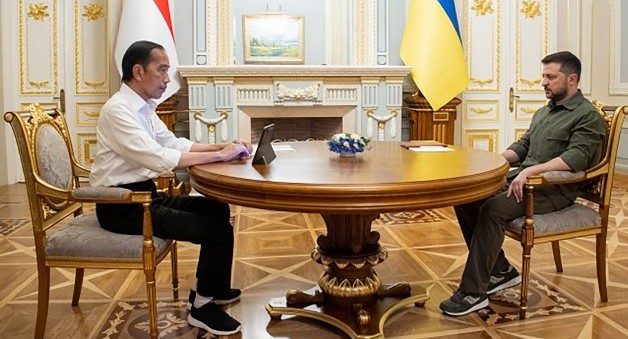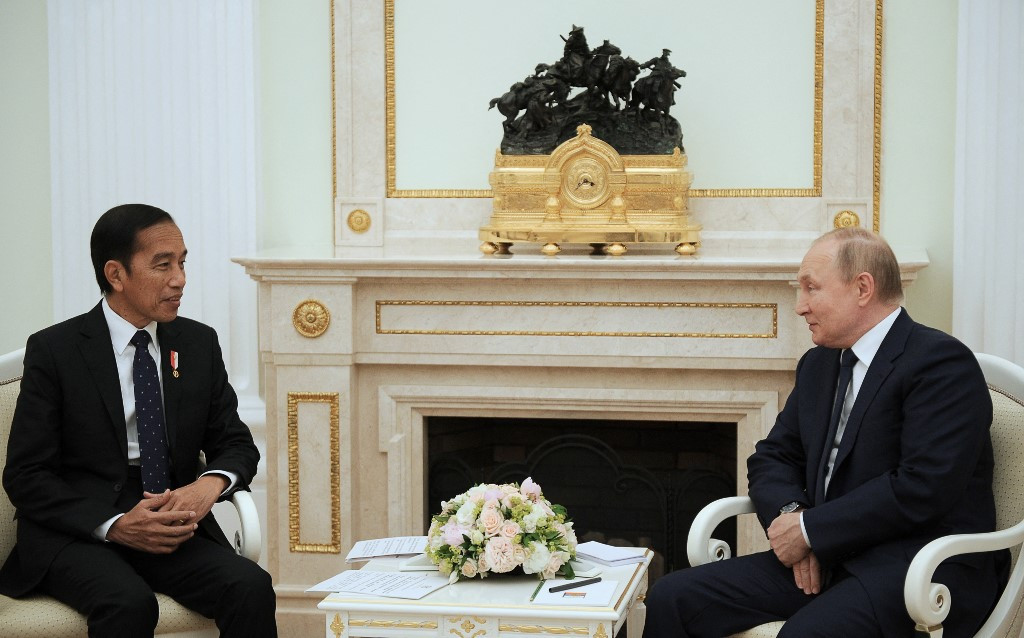July 2022JOKOWI ON THE WORLD STAGECommentary by Wayne Forrest It has been many years since an Indonesian leader actively engaged in global affairs and its current President has scrupulously avoided many international engagements because of his singular focus on improving the nation’s infrastructure and economy. President Jokowi recently departed from this scenario, wading into the Russia-Ukraine conflict. Jokowi deserves praise for his recent peace and food security mission. Jokowi said: “Issues of peace and humanity are always priorities of Indonesia’s foreign politics. In that context, I made this visit to Kyiv and Moscow… I have conveyed the message of President Zelensky for President Putin, and I have said that I am ready to be a bridge of communications between the two leaders.” His visit amid a world food crisis was certainly warranted; Indonesia relies on Ukraine for 25% of its wheat supply; turned into instant noodles, they are a major staple along with rice. Furthermore, as the democratically elected leader of the world’s fourth largest nation (273 million), and current G20 chairman, President Jokowi deserves respect. The world is always better off if Indonesia’s leaders are active and involved in global affairs. It has taken Jokowi time to do what his predecessor, Susilo Bambang Yudhoyono, did right from the beginning, but he has begun. Whether or not Indonesia owns leverage or power to bring about peace or a cease fire is another question. Jokowi’s visits to Ukraine and Russia (after attending the June G7 meetings as an observer) made a few headlines and elicited a promise that will probably turn out to be more empty than real. Jokowi, accompanied by his wife met Ukraine’s President Zelensky for two hours, offering to carry a message to Putin. The pair visited bombed out areas of Kviv and a hospital. On the day he departed for Moscow, a Russian cruise missile killed 20 shoppers at a Kviv mall. Jokowi has never condemned Russia for its attacks, seeing neutrality/non-alignment as being in its best interests. It may have been difficult for Jokowi to hold his tongue when he met the Russian President. President Putin told Jokowi he would keep Ukraine’s ports open for grain shipments. The statement may not have been genuine but it was a good takeaway for President Jokowi, inexperienced as he is in diplomacy. After meeting Putin Jokowi said:”I very much appreciate President Putin for having said just now that they will guarantee the safety of food and fertilizer supplies from Ukraine as well as from Russia. This is good news.” I find it startling that President Jokowi attempted to be a peace broker between two nations locked in a bitter, existential conflict. When he took office in 2014 foreign affairs was not part of his plan. But with the G20 chairmanship and recent appointment to the UN’s Member of UN Global Crisis Response Group, Jokowi has stepped out. Furthermore, Jokowi went against the rather insulting recommendation of China that Indonesia stay our of global power politics. The trip may have been more image than substance but is in line with what I would call Indonesia as an “Aspirational State”. Indonesia, under both Presidents Yudhoyono and Jokowi, has been thinking bigger, trying to will itself to greater things. President Jokowi has called for a “mental revolution”. Yudhoyono committed to huge carbon reductions. Indonesia not only believes it will become a modernized, developed country, it has made plans to achieve it, symbolized by its plan to build a totally new capital out of a jungle in Kalimantan powered by green energy. It also plans to have the world’s first fully digital central bank, an electrical grid not powered by coal, an integrated electric car industry, as well as self sufficiency in vaccines, rice, and downstream metal products. Delivering on all these hopes, dreams, and promises will be Indonesia’s singular challenge going forward.
|
American Indonesian Chamber of Commerce

- HOME
- ABOUT AICC
- The History of AICC
- Major Initiatives
- Trade, Tourism, and Investment Program (TTI)
- Opportunity Indonesia
- Introducing Indonesia: Scholastic Ambassador Program
- Preventing A Lost Generation
- Comprehensive Indonesian-English Dictionary
- Sustain Sumatra
- 10 Year’s After: A nationwide public awareness program
- Support to Mandiri Craft
- Congressional Staff Visit
- Business and Cultural Programs in Dallas, Texas
- US-Indonesia Women’s CEO Summit
- Topeng Sehat: AICC Initiative Against COVID-19
- 2021 Shipping NYC Surplus PPE To Indonesia
- Board of Directors
- Membership Benefits
- FAQ
- Membership Registration and Forms
- EVENTS
- LINKS
- TRADE LEADS
- LATEST NEWS/COMMENTARY
- DOING BUSINESSS
- COUNTRY DATA
- BLOG POSTS





AMERICAN INDONESIAN CHAMBER OF COMMERCE






